
Marple Lock Flight is a flight of sixteen canal locks, situated on the Peak Forest Canal in Marple, a suburb of Stockport.

Marple Lock Flight is a flight of sixteen canal locks, situated on the Peak Forest Canal in Marple, a suburb of Stockport.
Whilst the rest of the canal was opened to navigation by 1796, insufficient money was available to complete the necessary flight of locks to connect the two halves; a temporary tramway was therefore installed until such time as the locks could be completed, which finally happened in 1804. [1]
With the end of commercial carrying, the locks became dilapidated and, by the early 1960s, the flight had become impassible. Pressure in the late 1960s from the Peak Forest Canal Society and the Inland Waterways Association, who wanted to save the Cheshire Ring, resulted in the restoration and re-opening of the flight in 1974. [2]
Today, the location of the flight, with easy access to public transport and its scenic merits so close to a town centre, make it a popular destination with walkers; during the summer, small crowds can often be seen around the locks as boats pass through. [3]
The sixteen locks raise the canal by 209 feet (64 m), over the course of about a mile (1.6 km). [4]
Whilst this is a single flight, it can be divided into three different sections, each with a distinctive environment:
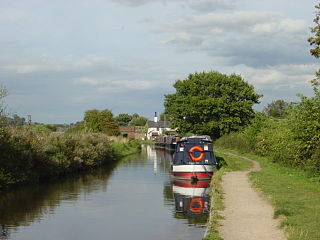
The Trent and Mersey Canal is a 93+1⁄2-mile (150 km) canal in Derbyshire, Staffordshire and Cheshire in north-central England. It is a "narrow canal" for the vast majority of its length, but at the extremities to the east of Burton upon Trent and north of Middlewich, it is a wide canal.
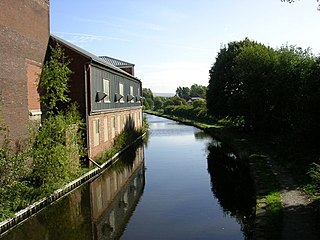
The Ashton Canal is a canal in Greater Manchester, England, linking Manchester with Ashton-under-Lyne.

Marple is a town in the Metropolitan Borough of Stockport, Greater Manchester, England. It is on the River Goyt, 9 miles (14 km) south-east of Manchester, 9 miles (14 km) north of Macclesfield and 4 miles (6 km) south-east of Stockport. In 2011, it had a population of 23,686.

Caldon Canal is a branch of the Trent and Mersey Canal which opened in 1779. It runs 18 miles (29 km) from Etruria, Stoke-on-Trent, to Froghall, Staffordshire. The canal has 17 locks and the 76-yard (69 m) Froghall Tunnel.

The Peak Forest Canal is a narrow locked artificial waterway in northern England. It is 14.8 miles (23.8 km) long and forms part of the connected English/Welsh inland waterway network.

The Rochdale Canal is in Northern England, between Manchester and Sowerby Bridge, part of the connected system of the canals of Great Britain. Its name refers to the town of Rochdale through which it passes.

The Macclesfield Canal is a canal in east Cheshire, England. There were various proposals for a canal to connect the town of Macclesfield to the national network from 1765 onwards, but it was not until 1824 that a scheme came to fruition. There were already suggestions by that date that a railway would be better, but the committee that had been formed elected for a canal, and the engineer Thomas Telford endorsed the decision. The canal as built was a typical Telford canal, constructed using cut and fill, with numerous cuttings and embankments to enable it to follow as straight a course as possible, although Telford had little to do with its construction, which was managed by William Crosley.
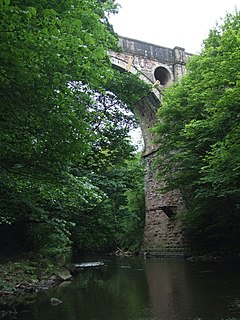
Marple Aqueduct at Marple, Greater Manchester, in north-west England was built to carry the lower level of the Peak Forest Canal across the River Goyt.

Fourteen Locks is a series of locks, also known as the Cefn Flight, on the Crumlin arm of the Monmouthshire Canal at Rogerstone in Newport, South Wales. The flight of locks was completed in 1799 and raises the water level 160 ft in just 800 yd. This is one of the steepest rises for a major run in the UK which, combined with the sheer number of locks, makes it one of the most significant in the country. The run of locks includes a series of embanked ponds, pounds, sluices and weirs to control the water supply, with no set of gates shared between individual locks. It therefore comprises a flight of locks rather than a lock staircase.
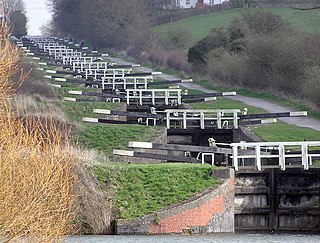
Caen Hill Locks are a flight of 29 locks on the Kennet and Avon Canal, between Rowde and Devizes in Wiltshire, England.

A large number of canals were built in Cheshire, England, during the early phases of the Industrial Revolution to transport goods and raw materials. This resulted in a significant canal network which is now enjoyed by holiday-makers, anglers, walkers, and others.

The Cheshire Ring is a canal cruising circuit or canal ring, which includes sections of six canals in and around Cheshire and Greater Manchester in North West England: the Ashton Canal, Peak Forest Canal, Macclesfield Canal, Trent and Mersey Canal, Bridgewater Canal and Rochdale Canal.
The BCN Main Line, or Birmingham Canal Navigations Main Line is the evolving route of the Birmingham Canal between Birmingham and Wolverhampton in England.

The South Pennine Ring is an English canal ring which crosses the Pennines between Manchester and Huddersfield. It covers parts of five canals, and includes passage through the longest canal tunnel in Britain. It has only been possible to cruise it since 2002, when restoration of the Huddersfield Narrow Canal provided the return route across the Pennines.

Bosley Lock Flight is a flight of twelve canal locks, situated on the Macclesfield Canal at Bosley, near Macclesfield, Cheshire, England. The locks are substantially built with stone blocks, and unusually for narrow locks have mitre gates at both ends. They were each built with a side pond, which enabled some of the water to be re-used during a filling and emptying cycle. The side ponds have been disused for many years, but there are plans to reinstate one of them for demonstration purposes.

Marple Junction is the name of the canal junction where the Macclesfield Canal terminates and meets the Peak Forest Canal at Marple, Greater Manchester, England.
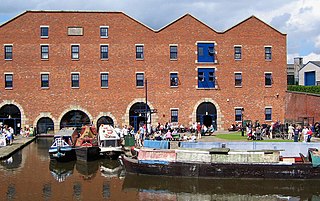
Dukinfield Junction is the name of the canal junction where the Peak Forest Canal, the Ashton Canal and the Huddersfield Narrow Canal meet near Ashton-under-Lyne, Greater Manchester, England. The area has been designated by Tameside Metropolitan Borough Council as a conservation area.

Hardings Wood Junction is a canal junction near Kidsgrove, Staffordshire, England and the point at which the Macclesfield Canal joins the Trent and Mersey Canal. It opened in 1831.

The Runcorn and Weston Canal was a short canal near Runcorn in Cheshire, England, constructed to link the Weston Canal, which is part of the River Weaver Navigation, to the Bridgewater Canal and Runcorn Docks. It was completed in 1859, but was little used. Around half of it became the Arnold Dock in 1876, when it was made wider and deeper, and linked to Fenton Dock by a ship lock. The dock section and some of the remaining canal were filled in during the 1960s, and the remainder is in a derelict state.

The Runcorn to Latchford Canal ran from Runcorn, Cheshire to the Latchford area of Warrington, then in the historic county of Lancashire, England. It connected the Mersey and Irwell Navigation to the River Mersey at Runcorn.
Route map: